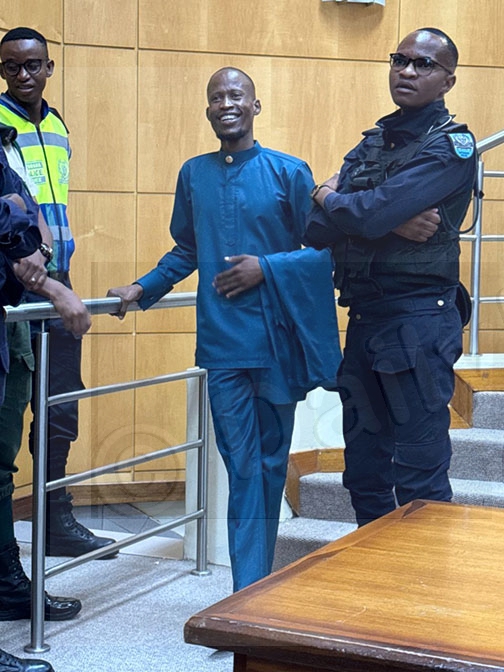Government should respect court orders - Dingake
23 Jun 2015
Justice Key Dingake of Gaborone High Court says he agrees with jurisdictions, which hold the vioew that government should lead by example by obeying orders.
Justice Dingake made the remarks in a case in which he ruled in favour of a foreign prison inmate, Gift Mwale, who had sought the court to order government to provide him with free ARV treatment because he was HIV positive and could not afford to buy the medication because he was in jail.
His application succeeded in that an earlier ruling on a similar case handled by Judge Bengbame Sechele had required government to provide foreign prison inmates who were eligible for HAART enrolment with ARV treatment.
However, government appealed the order without applying for stay of execution.
Justice Dingake said government was not a special litigant, entitled to choose whether to obey or not to obey court orders. He said it was important, and in public interest, that government must lead by example, in obeying the orders issued by the country’s judiciary.
Judge Dingake pointed out that it was in the interest of the public, and the rule of law, that government respect the orders issued by the courts. He said where government, as a litigant, is unhappy with the decision of the courts; it is entitled to appeal and approach the court for a stay of execution within a reasonable time of receipt of the adverse decision.
He said the option to ignore the court order because an appeal has been filed is not open to any litigant, no matter how unhappy.
Meanwhile, when focusing on the main case, he said the question that sharply falls for determination in this matter is whether the denial by prison authorities or government to avail ARVs to foreign inmates who are HIV/AIDS positive, whilst availing same to Batswana prison inmates, violates Sections 3,4,7, and 15 of the Constitution of Botswana.
Antiretroviral Therapy (ART) is treatment of people infected with HIV using anti-HIV drugs.
The standard treatment consists of a combination of at least three drugs often called Highly Active Antiretroviral Therapy (HAART) that suppresses HIV replication. HAART has the potential both to reduce mortality and morbidity rates among HIV infected people, and to improve their quality of life.
In his finding, judge Dingake said the applicant in the matter is not only a foreigner, but is also a prisoner who resides in a space where different layers of vulnerability collude and collide, a state of affairs that requires a higher onus upon the court to handle the matter with the care that HIV-related legal issues necessarily implicate.
“The applicant exists at the intersection of several sites of marginalisation and vulnerability. He is incarcerated, he is a foreigner, and he is a person living with HIV. Central to effective HIV care is access to antiretroviral medicines, which have transformed HIV from a rapidly progressing, fatal illness to one that is manageable,” he said.
He however, said the issues implicated in this matter are best illuminated by a consideration of the position of prisoners in international law, more especially the question whether States are obliged to avail medical treatment to those they have imprisoned.
Nonetheless, judge Dingake said the human rights of prisoners are articulated in a number of international legal instruments, declarations and statements.
These include among others; Universal Declaration of Human Rights (1948), United Nations Standard Minimum Rules for the Treatment of Prisoners (1955), United Nations Principles of Medical Ethics relevant to the Role of Health Personnel, particularly physicians, in the Protection of Prisoners Detainees against Torture and Cruel, Inhuman and Degrading Treatment or Punishment (1982) and United nations basic Principles for the Treatment of Prisoners (1990).
Justice Dingake however, lamented that the court is conscious that some jurists especially of the yesteryear, frown upon reliance on declarations or resolutions by United Nations and other regional bodies.
He said although “Soft Law”, the term used to refer to the aforesaid declarations and resolutions, is not law, and therefore not binding, in international law it is accepted as affording important guidance.
The Zimbabwean born Mwale had cited Attorney General of Botswana, Commissioner of Prisons and Minister Health as respondents in his civil suit to force government to provide him with free ARV.
He had argued that the decision by the respondents to deny him the provision of HAART treatment is in violation of the equal protection clause of the Botswana Constitution viz Section 3 of the Constitution.
In his judgement, Justice Dingake ruled that the decision of the respondents to deny him ARV treatment are in breach of their obligation to provide medical care to those in the care of prison authorities in terms of the Prisons Act Cap 21:03.
The respondents were also ordered to pay the cost of the application jointly and severally, the one paying the other to be absolved. Mwale was represented by Messrs Kabo Motswagole and Friday Leburu while the respondents were represented by Ms Yarona Sharp from the AGs. Ends
Source : BOPA
Author : Benjamin Shapi
Location : Gaborone
Event : Court
Date : 23 Jun 2015





